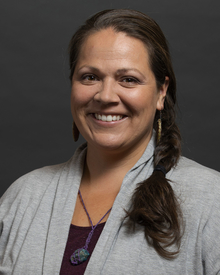Mind Body Medicine is a training program that focuses on the connection between our mind and body as a way of better understanding ourselves and our health. Extension’s Susan Beaulieu, Tribal community facilitator, leads this training. Aside from being an integral part of the American Indian Resource and Resiliency Team, Susan is a mother of four, working on her dissertation for her doctorate in the Social & Administrative Pharmacy program and co-hosts Remembering Resilience, a podcast on Native American resilience through and beyond trauma.
A large component of Mind Body Medicine is learning about what happens in the body when we have a stress response and being able to recognize those sensations so that we can use certain practices to regulate ourselves. Regulation of bodily stress responses is critical for long-term wellness and health.
“When we're in the stress response, the body releases glucose as a way to be able to give our body more energy to fight harder, run faster, whatever it is. That's great in the short-term but everyday all throughout the day our bodies keep getting a dump of glucose that can lead to diabetes,” says Beaulieu.
Mind Body Medicine contains a set of practices that help us reconnect to our physical body, our emotional selves, our mental selves and our spiritual selves so it's this recognition that we are more than just a physical body. Emotions aren’t good or bad, it is what we do with them. Indeed much of the program is about reframing and thinking differently about emotions and ourselves. While not designed by or for Indigenous people specifically, it nonetheless contains Indigenous wisdom. “Communities or tribes in the United States, we have this belief that there are four parts of who we are: physical, mental, emotional and spiritual and the curriculum identifies that,” states Beaulieu.
Susan also shared feedback from participants on the various ways that their training has helped them cope with difficult situations. “One of our participants was able to use the tools to help her work through trauma, as opposed to repressing it or running from it or having an all-out anxiety attack. She hasn't had any major anxiety attacks since she started learning these skills, she's had anxiety come up but it's never gotten to that point of a full blown panic attack. It's such a good reminder of that mind-body connection.”
“I feel like it's a really holistic, well-rounded approach to the work, where we're not just focusing on one specific thing but we're really helping people understand all of it.”


